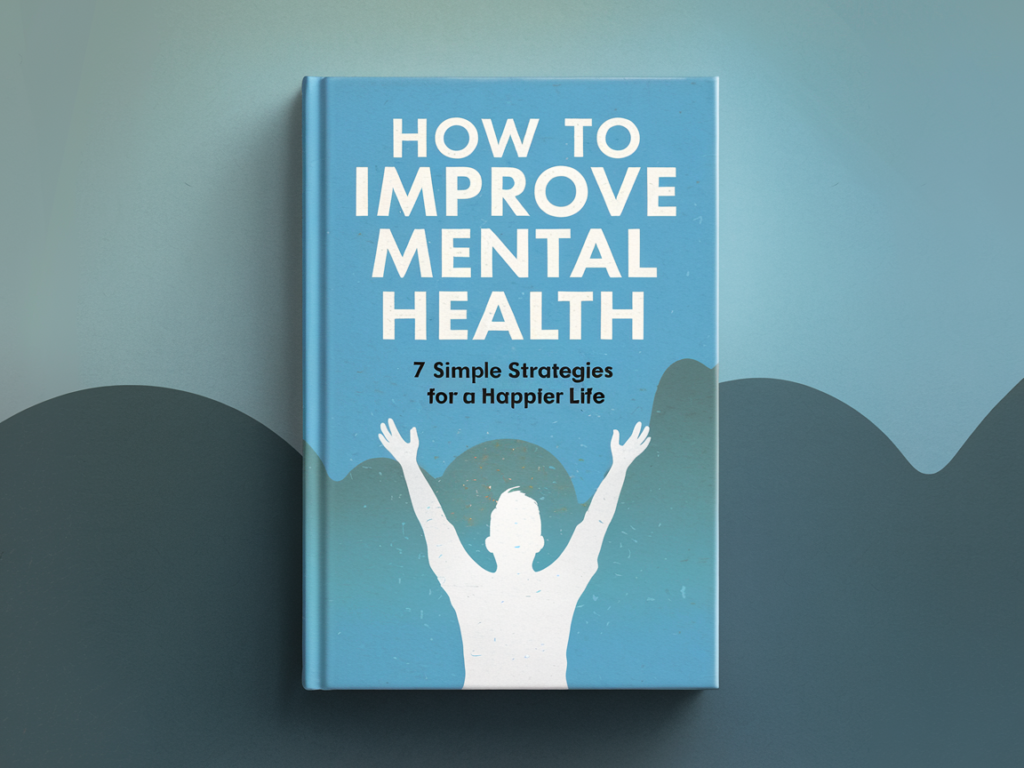
"Boost your well-being with these 7 simple strategies for a happier, healthier mind. Small changes, big impact!"
Meta Description:
“Learn how to improve mental health with 7 simple strategies. Discover tips on exercise, sleep, mindfulness, and nutrition to boost emotional well-being and overall happiness.”
How to Improve Your Mental Health: 7 Simple Strategies for a Happier Life
Mental health plays a crucial role in overall well-being. It affects how we think, feel, and behave, and influences our ability to handle stress, build relationships, and make decisions. By focusing on mental well-being, you can enhance your quality of life, achieve emotional balance, and feel more fulfilled.
In this article, we’ll explore seven simple but powerful ways to enhance your emotional health and boost overall happiness.
1. Stay Active: Exercise for Better Mental Clarity

Physical activity is one of the most effective ways to improve mental wellness. Exercise releases endorphins, often known as “feel-good” hormones, which can significantly reduce feelings of stress and anxiety.
- Why it’s essential: Regular movement not only boosts mood but also enhances cognitive function, making you feel more alert and energized.
- How to do it: Aim for at least 30 minutes of moderate activity each day, such as walking, jogging, yoga, or cycling.
Tip: Find an activity you enjoy. This will help you stay motivated to incorporate it into your routine.
Learn more about how exercise supports emotional well-being on The Mayo Clinic’s website.
2. Practice Mindfulness and Meditation
Mindfulness and meditation are excellent tools to enhance emotional health. By focusing on the present moment, you can reduce stress and prevent your thoughts from spiraling into negative patterns.
- Why it’s effective: These practices help you manage anxiety and improve emotional regulation.
- How to do it: Start with just a few minutes each day. Focus on your breathing and gently bring your mind back when it starts to wander.
Tip: Use apps like Calm or Headspace for guided meditation sessions to make the process easier.
For more insights into mindfulness practices, visit Mindful.org.
3. Eat a Balanced Diet for Mental Wellness

Your diet plays an important role in maintaining a healthy mind. Certain nutrients, like omega-3 fatty acids, antioxidants, and B vitamins, are vital for brain function and emotional stability.
- Why it matters: Eating a well-balanced diet helps reduce inflammation and supports your mood and cognitive abilities.
- How to do it: Include more whole foods like fruits, vegetables, lean proteins, and healthy fats in your meals.
Tip: Try foods like salmon, spinach, and walnuts, which are rich in nutrients that support brain health.
For more information on nutrition’s role in mental health, visit Harvard’s Nutrition Source.
4. Stay Connected with Friends and Family

Maintaining strong relationships is key to supporting your mental health. Social connections help combat loneliness, provide emotional support, and strengthen your resilience during tough times.
- Why it’s important: Socializing promotes feelings of belonging and reduces feelings of isolation.
- How to do it: Schedule regular catch-ups with loved ones, even if it’s through virtual calls or messages.
Tip: Join groups or community events where you can meet new people and expand your support network.
For more on building strong social connections, check out Psychology Today.
5. Get Enough Sleep for Mental Balance
Quality sleep is essential for maintaining emotional health. Sleep helps regulate mood, improve memory, and boost cognitive function, allowing you to approach challenges with clarity.
- Why it’s vital: Poor sleep is linked to mood disorders like anxiety and depression, while proper rest enhances emotional resilience.
- How to do it: Aim for 7-9 hours of sleep each night. Create a relaxing pre-bedtime routine to signal to your body that it’s time to wind down.
Tip: Avoid electronic devices an hour before bed to promote better sleep quality.
Explore more about sleep and mental health at The National Sleep Foundation.
6. Set Realistic Goals and Stay Organized
Setting goals helps provide structure and direction. By breaking down tasks into manageable steps, you can reduce stress and increase your sense of accomplishment.
- Why it’s helpful: Goal-setting provides purpose and a sense of achievement, which can improve your overall mood.
- How to do it: Use planners or digital tools to organize your daily tasks and celebrate your progress.
Tip: Set small, achievable goals each day to maintain motivation and a positive mindset.
Learn more about the impact of goal-setting on mental well-being at Psychology Today.
7. Seek Professional Help When Necessary
Sometimes, the best way to support your mental health is by seeking professional help. Therapy or counseling provides valuable tools and strategies to manage stress, anxiety, and other emotional challenges.
- Why it’s important: A trained therapist can help you process difficult emotions and develop healthy coping mechanisms.
- How to do it: If you’re struggling, reach out to a licensed therapist or counselor for support.
Tip: It’s okay to ask for help—mental health professionals are there to guide you through challenging times.
For resources on mental health support, visit Mental Health America.
Conclusion: Make Mental Health a Priority
Improving your mental health doesn’t require drastic changes. By focusing on simple habits like regular exercise, mindfulness, quality sleep, and a balanced diet, you can greatly enhance your emotional well-being. Remember, mental health is a journey, and even small, consistent actions can make a significant difference in your happiness and quality of life.
Start implementing these strategies today, and take control of your mental well-being for a brighter future.
FAQs
Q1: What are some natural ways to improve mental health?
A1: Regular exercise, mindfulness practices, a healthy diet, good sleep hygiene, and social connections are all effective natural ways to enhance mental health.
Q2: What foods are best for mental wellness?
A2: Foods rich in omega-3 fatty acids, antioxidants, and B vitamins, such as fatty fish, leafy greens, and nuts, support brain function and emotional health.
Q3: How can I improve my mental health without therapy?
A3: Incorporate healthy habits like exercise, meditation, eating a balanced diet, and maintaining social connections to improve mental well-being.
Q4: Is sleep important for mental health?
A4: Yes, adequate sleep is crucial for emotional regulation, cognitive function, and overall mental wellness.
Q5: How can I stay mentally healthy during stressful times?
A5: Practice mindfulness, set realistic goals, stay connected with loved ones, and take breaks when needed to reduce stress and maintain mental clarity.





